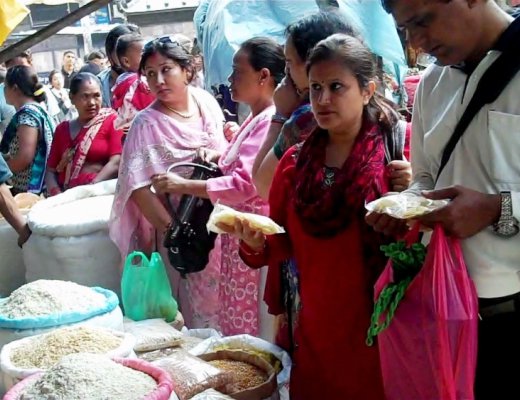
The import of rice and paddy decreased by 27.67 per cent, while the import of wheat decreased by 97.8 per cent. Similarly, import of maize dropped by 20.24 per cent during the first seven months of the current fiscal year.
The country has been spending billions of rupees for the import of cereals to meet the domestic consumption.
The import of cereals has decreased significantly during the first seven months of the current fiscal year 2022/23. According to the trade statistics of the Department of Customs, the country imported cereals worth around Rs. 34.67 billion during the first seven months of the current fiscal year 2022/23.
Cereals worth Rs. 50.53 billion were imported during the first seven months of the last fiscal year 2022/23. There has been a decrease of 31.38 per cent in cereal imports compared to the same period last year. During the review period, rice and paddy worth Rs. 23.42 billion, maize worth Rs. 10.4 billion and wheat worth Rs. 101 million were imported.
Similarly, barley worth Rs. 8.17 million, buckwheat worth Rs. 2.75 million and millet worth Rs. 12 million had been imported during the review period. Paddy and rice worth Rs. 32.38 billion, maize worth Rs. 13.04 billion, wheat worth Rs. 4.6 billion and millet worth Rs. 18 million were imported during the first seven months of the last fiscal year 2021/22.
In the last fiscal year 2021/22, the country imported cereals worth Rs. 74.27 billion including paddy and rice worth Rs. 47.57 billion, maize worth Rs. 19.64 billion and wheat worth Rs. 6.32 billion.
Spokesperson of the Ministry of Agriculture and Livestock Development Prakash Kumar Sanjel said that the import of cereals has decreased during the review period due to increase in the production of cereals in the country and restriction in the export of paddy and wheat by the government of India.
He said that the import of cereals, especially paddy, rice and wheat has decreased significantly in terms of quantity and amount as well during the review period despite the price of food grains going up by around 10-15 per cent due to Russia and Ukraine war in the international market.
According to him, the increment in the price of food grains in the international market has also led to a decline in import. The government of India had banned the export of rice and wheat citing there was insufficient supply to meet its domestic demand.
According to the Ministry of Agriculture and Livestock Development (MoALD), paddy production has increased by 6.94 per cent to 5.486 million tonnes in the fiscal year 2022/23 compared to last year’s production.
This paddy will be enough to produce 3.52 million tonnes of rice. According to this calculation, there will be a shortage of about 480,000 tonnes of rice in Nepal.
A total of 5.13 million tonnes of paddy was produced in the last fiscal year 2021/22. In the fiscal year, 2020/21, Nepal had grown 5.621 million tonnes of paddy, the highest yield.
Spokesman Sanjel said that although the import of food grains has decreased, the import of food grains, especially paddy and rice, is still higher than the national requirement.
He said, “It is necessary to study why a large amount of grain is being imported despite the annual increase in production.” The price of rice has increased by up to Rs. 20 a kg, depending on varieties in the retail market over a month, said retailers.
“This is the season of the arrival of new rice in the market and the price has to go down, but the price has been increasing significantly in almost every week or month,” said Amul Kaji Tuladhar, general secretary of Nepal Retailer Association.
In the last one month, the price of rice increased by Rs. 10-20 per kg based on the quality of rice, he said.
He added, “There is no reason for the increase in the price of rice when new rice comes to the market. Suppliers and wholesalers are selling rice at higher prices to retailers citing the increase in import costs.”
Source: The Rising Nepal
- PM Oli Returns Home Attending UN FFD4 Summit
- Jul 05, 2025
- Trump signs into law domestic policy bill
- Jul 05, 2025
- Putin-Trump call after US halts some arms shipments to Ukraine
- Jul 04, 2025
- USAID programs officially suspended
- Jul 03, 2025
- Thailand’s Constitutional Court suspended PM Paetongtarn Shinawatra
- Jul 02, 2025















